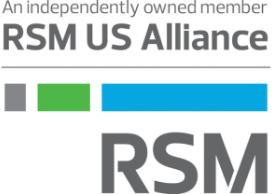
GreerWalker is a proud member of RSM US Alliance, a premier affiliation of independent accounting and consulting firms in the United States. RSM US Alliance provides our firm with access to resources of RSM US LLP, the leading provider of audit, tax and consulting services focused on the middle market. RSM US LLP is a licensed CPA firm and the U.S. member of RSM International, a global network of independent audit, tax and consulting firms with more than 43,000 people in over 120 countries. Our membership in RSM US Alliance has elevated our capabilities in the marketplace, helping to differentiate our firm from the competition while allowing us to maintain our independence and entrepreneurial culture. We have access to a valuable peer network of like-sized firms as well as a broad range of tools, expertise, and technical resources. For more information on how GreerWalker can assist you, please call (704) 377-0239.
On Nov. 18, 2021, North Carolina Gov. Roy Cooper signed Senate Bill 105, the biennium budget bill, which includes several significant changes to the state’s tax regime. The changes include a phase-out of the corporate income tax, a simplification to how the franchise tax is calculated, a reduction in personal income tax rates, a host of conformity provisions and the creation of a pass-through entity tax.
Corporate income tax phase out
North Carolina will join a handful of states by eventually phasing out its corporate income tax. The state’s current 2.5% corporate income tax would be phased out by 2030. Beginning in 2025, the rate would be reduced to 2.25%, 2% in 2026, 1%in 2028, and phased out completely for 2029 and later. The states’ corporate income tax rate was as high as 6.9% in 2013. The current rate remains one of the lowest in the country.
Franchise tax limits
The budget law will simplify the state’s franchise tax. Under previous law, the tax was determined by the highest of three separate calculations. The new law calculates the tax only on a business’ North Carolina net worth. The franchise tax changes are effective for taxable years beginning on or after Jan. 1, 2023, and applicable to the calculation of franchise tax reported on the 2022 and later corporate income tax return.
Personal income tax reductions
Individual income tax rates will also be lowered from 5.25% to 3.99% over six years. Beginning in 2022, the rate will be reduced to 4.99%, 4.75% in 2023, 4.6% in 2024, 4.5% in 2025, 4.25% in 2026 and 3.99% for all tax years thereafter. In addition, the standard deduction would increase by $4,000 for joint filers, $3,000 for heads of household and $2,000 for single filers. The child tax deduction increases by $500 per child.
Conformity provisions
The bill also makes changes to general conformity to the Internal Revenue Code, adopting April 1, 2021 as the amended reference date, previously May 1, 2020. Taxpayers should consider that the amended reference date includes at least two significant federal legislative packages impacting various tax provisions.
The budget bill provides a number of exceptions or limitations to conformity. A few noteworthy provisions, including new or continued decoupling, are highlighted below:
- Decouples from the federal charitable contribution expansion
- Decouples from the mortgage interest treatment for 2021
- Decouples from the increased food and beverage deduction for 2021 and 2022
- Decouples from the limited student loan discharge provisions for 2021 through 2025
- Decouples from the income exclusion of certain unemployment benefits provisions for 2020
- Conforms to Paycheck Protection Program expense deductibility through 2022
Pass-through entity tax workaround
Effective Jan. 1, 2022, the budget bill adopts an elective pass-through entity tax as a workaround to the federal individual SALT deduction limitation of $10,000 enacted by the Tax Cuts and Jobs Act in 2017. The pass-through entity must elect on its annual return and cannot revoke the election after the due date of the return, including any extensions. The election cannot be made by a publicly-traded partnership described in section 7704(c). Partners in the electing entity must be individuals, estates or certain trusts and organizations described by sections 1361(c)(2) and 1361(c)(6).
North Carolina joins 20 other states by adopting a new pass-through entity tax. Over a dozen of the workarounds have been adopted in 2021 alone. Taxpayers considering the election should consider that federal proposals in the Build Back Better legislation are likely to impact the federal SALT deduction by either increasing the cap, implementing income limits or a combination of both. The likely changes to the SALT deduction may be just one consideration for an eligible entity in choosing to elect.
Net operating loss provisions
The bill makes changes to the individual calculation for net operating losses in order to address a number of disparities that could exist under current law, especially with nonresidents.
Takeaways
The changes set forth in the budget bill are significant and will affect current tax filing and long-term planning. The personal income tax reductions will likely change the burdens of shareholders and partners in pass-through entities operating in North Carolina. Many businesses will benefit from the change in the franchise tax, particularly large, capital intensive companies. The phase out of the corporate tax – while over a period of seven years – may influence both business formation and location decisions. Finally, owners of pass-through entities must consider whether to elect into the new entity-level tax. Those decisions will likely be influenced by the availability of credits in other states and changes to the federal limitations on the state and local tax deduction. Taxpayers with questions are encouraged to speak to their North Carolina tax advisers for more information.
Let’s Talk!
Call us at (704) 377-0239 or fill out the form below and we’ll contact you to discuss your specific situation.
This article was written by Charles Britt, David Brunori and originally appeared on 2021-11-22.
2022 RSM US LLP. All rights reserved.
https://rsmus.com/insights/tax-alerts/2021/north-carolina-budget-cuts-income-taxes-adopts-salt-workaround.html
The information contained herein is general in nature and based on authorities that are subject to change. RSM US LLP guarantees neither the accuracy nor completeness of any information and is not responsible for any errors or omissions, or for results obtained by others as a result of reliance upon such information. RSM US LLP assumes no obligation to inform the reader of any changes in tax laws or other factors that could affect information contained herein. This publication does not, and is not intended to, provide legal, tax or accounting advice, and readers should consult their tax advisors concerning the application of tax laws to their particular situations. This analysis is not tax advice and is not intended or written to be used, and cannot be used, for purposes of avoiding tax penalties that may be imposed on any taxpayer.
RSM US Alliance provides its members with access to resources of RSM US LLP. RSM US Alliance member firms are separate and independent businesses and legal entities that are responsible for their own acts and omissions, and each are separate and independent from RSM US LLP. RSM US LLP is the U.S. member firm of RSM International, a global network of independent audit, tax, and consulting firms. Members of RSM US Alliance have access to RSM International resources through RSM US LLP but are not member firms of RSM International. Visit rsmus.com/aboutus for more information regarding RSM US LLP and RSM International. The RSM(tm) brandmark is used under license by RSM US LLP. RSM US Alliance products and services are proprietary to RSM US LLP.

GreerWalker is a proud member of RSM US Alliance, a premier affiliation of independent accounting and consulting firms in the United States. RSM US Alliance provides our firm with access to resources of RSM US LLP, the leading provider of audit, tax and consulting services focused on the middle market. RSM US LLP is a licensed CPA firm and the U.S. member of RSM International, a global network of independent audit, tax and consulting firms with more than 43,000 people in over 120 countries. Our membership in RSM US Alliance has elevated our capabilities in the marketplace, helping to differentiate our firm from the competition while allowing us to maintain our independence and entrepreneurial culture. We have access to a valuable peer network of like-sized firms as well as a broad range of tools, expertise, and technical resources. For more information on how GreerWalker can assist you, please call (704) 377-0239.









